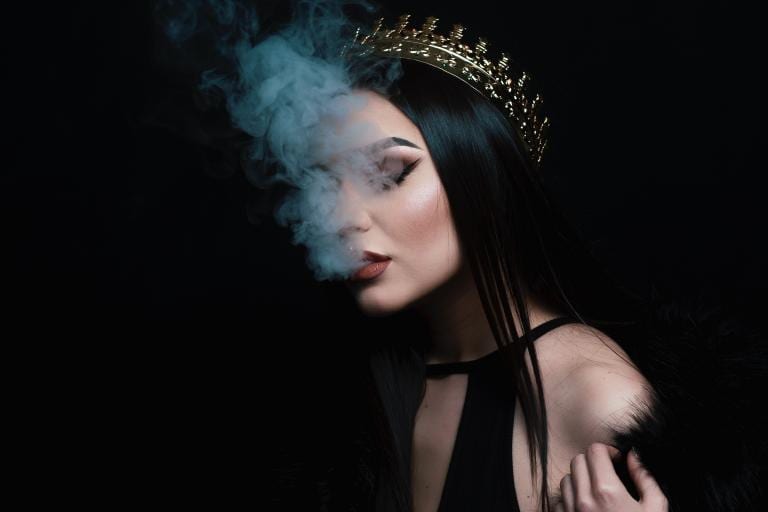
In the last few years, I have grown increasingly more confident in my exterior appearance. I have learned to love my curves, my folds, my stretch marks, and more. I have come to appreciate the “toll” my body has endured from birthing 5 children over a ten-year span. Despite the atrocious ideologies that plagued my life—a Christian fundamentalism that inundated me with an understanding that I was to hide my body and be ashamed of its potential; I have overcome a negative narrative and decided to love me for me.
I decided to love me and see me the way my husband always has. Flaws and all. I decided that at 148 pounds or 125 pounds that I was beautiful in the form God gifted to me. I lifted the veil to reveal the crown and now, everybody is trying to knock it down.
Knocking Down the Crown
I understand why. We are taught to knock down crowns, not help keep them atop others’ heads. Women especially are programmed to believe that any other female representation that esteems confidence in her appearance and body is to be judged, mocked, shamed, and reduced to categories and labels that diminish her status. We are programmed to project our insecurities onto other women and our culture actually justifies this atrocious act. Good, Christian, modest women truly believe they are doing right when they let another woman know that how she looks is wrong. I cannot count the number of times I have had well-intentioned women tell me that if I am not careful, I am “going to get” what I “deserve” because of the way I present myself. What is it that I deserve I wonder?
But then we do something remarkably contradictory when it comes to women who we are willing to praise. The women who reveal to us that they are trying to make changes in their diets, to their health, or, those who are overcoming a past of abuse and victimization, are free to step into a skin of acceptance, and everybody rushes to join the bandwagon of edification and adoration.
Take for instance the time in my life when I was bodybuilding. I shared before and after photos of my body, wearing nothing more than bra and panties. The response was phenomenal and encouraged me to keep going. No one told me that I should cover up or reconsider what I was wearing in my photos.
When I shared photos of myself in a bikini, after having twins, again, the response was overwhelmingly supportive. “Look at how amazing you look after 5 kids! WOW!” “Share your secret, what are you doing to lose the weight?” “Oh my gosh, I wish I looked that good after having just one kid!”
In both instances, I was internally battling my own self-deprecating thoughts. I was torn between my Christian ideals and my desire to use a social media platform to keep me accountable to continue to work hard to transform my post-baby body. In both scenarios, however, it was other people telling me that I was amazing for having the courage to share my story and my progress with others. It was other people’s encouragement, not my own, that gave me this force to propel forward.
If a woman simply wants to express herself in an erotic manner, however, the response is certainly not the same. And that’s odd, given the fact that I am still the same woman, in a manner of speaking. Given the context, I can understand the response. It’s one thing to be a cheerleader for a woman with stretch marks and saggy breasts trying to firm her form up to compete in a figure competition. It’s quite another to praise a woman who wants to show her cleavage all for the sake of teaching others how to embody their erotic self. I mean, why would anyone praise a woman for embodying who she is? We’d much rather praise a woman for admitting that she isn’t who she could be…yet. We praise her potential to change?
Potentiality—A Threat!
What is it about the potential that arouses the desire to encourage another? Is it because it reflects our own potentiality to strive to change something about ourselves? Perhaps it’s that when we see another act toward a goal, it inspires us?
After I quit training and gave up on the idea of competing, I embraced a more providential and puritanical set of beliefs and began covering myself back up. I was repulsed by my body at times. So much so that I didn’t want my husband to look at or even enjoy my body.
Thankfully, over the years, I gradually learned how to accept myself and love my flesh. It took a lot of deprogramming and patience. I was inspired in recent years by a friend who began training for a bodybuilding competition. Initially, her posts made me feel super insecure about my own body. But then she did something amazing—she shared her own insecurities about her training. Her revelation of her fears reflected that of my own and I finally felt seen. It was in that moment that I saw her crown and all I wanted to do was hold it up for her.
So yes, potential inspires us. The gift of that inspiration is imitation. That’s why we share our stories. Our stories inspire others in such a way that we all end up imitating the good reflected by others—or at least, we ought to.
Seeing another act on her (or his) potential motivates us to act and consider making changes. And who could be upset with that? When we see another doing something good for themselves and most importantly, for their health, we not only want to encourage that, we want to duplicate it. Sometimes, we want to use that model as the model for “how things should be.” And strangely, our encouragement is a form of our inclusion in her goals. We can feel like we are participating in her journey with her while also redirecting our own journey.
Isn’t it also potential that threatens us when we condemn a woman who has actualized her goals? What the heck is that about? Well, again, I understand this because I have been the target of this perceived threat of potentiality. Not only do I have the potential to make my own husband jealous and to lead him astray, but I also have the potential to lure other men into my circle and provoke them to have thoughts of lust. Or so I have been told. Nothing like holding another woman responsible for the thoughts of a man, am I right?
I have also been told that my exposure makes other women uncomfortable. I have had male friends end their friendships with me because their wives couldn’t “handle” the perceived threat that I had become. All based on images and glimpses of my flesh that apparently, are just too provocative for the Facebook.
What’s really provocative is how easily a woman is willing to reduce another woman all because she perceives her beauty as a threat when beauty itself is a gift from God. Behaviors that stifle beauty are done by those who refuse to see the beauty they themselves radiate. These women cannot see their own crowns, nor do they feel like anyone else will help them hold their crown up. I know this because I have been in the same situation.
But what if there’s another reason that potentiality is a threat? When we see the beauty and we don’t feel as beautiful as the beauty we perceive, we feel excluded. When a woman comes out of her shell and decides to embrace her natural essence—that of sexuality intertwined with eroticism, those who have not found the space to express themselves feel automatically rejected because of the exclusion.
There’s a Difference!
But of course, the context matters, doesn’t it? Bodybuilding and weight-loss is much different than say, a woman posing seductively in a bikini, short dress, or (gasp) lingerie. I reckon that’s because bodybuilding and weight-loss seemingly have nothing to do with eroticism or sexuality.
On the contrary! The very act of caring for the body—for the self—is by its very nature erotic. And that which is erotic is that which ties the animal sexuality of humans to the potentiality of our capacity for love. Eroticism is transformative love energy.
A divergent view would suggest that erotic expression differs from the expression of physical transformation in that it removes lust from the intentionality. It is assumed, of course, that any woman who spontaneously displays herself in an erotic manner must have ulterior motives, and that those motives are energized by an obvious fallen nature of depravity and disillusionment or sin.
A lot of that has to do with the narrow definition of erotic and how it has been (intentionally) severed from emotionality, and cleverly bound to pornography for easy dismissal of the topic altogether. The truth is, we don’t want to talk about eroticism because we don’t understand it. The reason we don’t understand it is because for too long, we feared its potential. Because of fear, we did everything we could to keep its power a secret; to the extent that “erotic” is now synonymous with “pornography.” The devastating result of this forced union of opposites is that nobody wants to talk about anything that has to do with S-E-X out of fear that if we do, it might be associated with “pornography.”
According to Definitions from Oxford, the word “pornography” is defined as: “printed or visual material containing the explicit description or display of sexual organs or activity, intended to stimulate erotic rather than aesthetic or emotional feelings.”
Wikipedia defines pornography as follows: Pornography (often shortened to porn) is the portrayal of sexual subject matter for the exclusive purpose of sexual arousal.
There are problematic premises here that distort the beauty of eroticism by insisting that erotic is somehow distinctly separate from “emotional feelings.” That cannot be. Eroticism is the animation of divine imitation which certainly depends on not only an emotional response, but also a physical, mental, spiritual, and sexual response. It’s a fully dimensional phenomenon that cannot be separated from emotion.
Sexual arousal is also not (always) separate from emotion. As we can see again, we attach words to one another without considering their distinctions from one another. Sexual arousal is juxtaposed with erotic feelings, and erotic feelings are separated from emotional feelings.
The distinction that I use as my guide is this: Pornography is separate from eroticism as pornography doesn’t demonstrate or relay emotional connection. Emotion is fundamental for eroticism. Pornography is also intentionally, graphically, sexually explicit. Eroticism isn’t always so explicit. Sometimes, it’s subtle and seductive. Eroticism is not always sexual, either.
Once we understand that the context is similar in the manners of expressing the body, we can begin to build a new understanding of eroticism and embrace our sexuality. If we are willing to consider that the word play of eroticism is too often negatively paired with pornography, we can invite in new discussions about expressionism and the female form that we feel safe participating in. Sometimes, we must be reintroduced to words and scenarios with a new lens and a new definition.
The potential lurking behind the next image you see doesn’t have to be received as a threat. Potential can be a gift! When we can see the beauty in others it’s because we know good and well that there lies beauty within us! When we refuse to see the beauty in the world, it says a lot about how we perceive ourselves and our own contributions to the world.
Your crown is there, it’s there to stay, and you can hold it up on your own. You are a part of the universe’s beauty.












